A filmmaker undertook intensive research in 2013 on the city's Irani cafe culture. The result of that study? A brand new Irani cafe, Mumbai's first in 50 years, finds Anju Maskeri
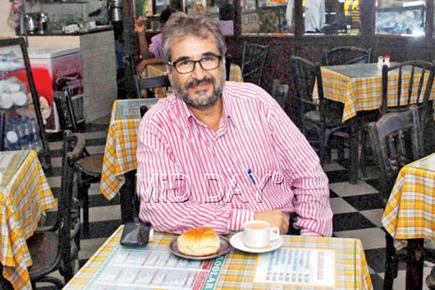
Dr Mansoor Showghi Yezdi at Matungau00c3u00a2u00c2u0080u00c2u0099s Koolar & Co Restaurant & Stores.
This 370-sq-ft space at Rosary Chawl, Mahim West, wears a rather desolate look for a Thursday afternoon. “All the workers are fasting for Ramzan and will get back to work in the evening,” says Dr Mansoor Showghi Yezdi, as he leads us into Café Irani Chaii — Mumbai’s first Irani café to come up in five decades.
ADVERTISEMENT
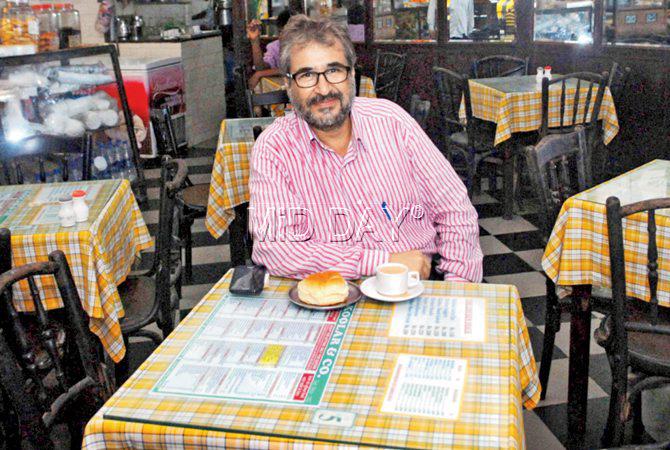
Dr Mansoor Showghi Yezdi at Matunga’s Koolar & Co Restaurant & Stores. Pic/Shadab Khan
The shutter is half down, plastic sheets are up to protect the walls from moisture and the newspapers on some of the mirrors have still not been taken down. “It’s a work in progress,” admits 58-year-old Yezdi, as he offers us a couple of bentwood chairs to sit, while offering a nugget of information — “did you know that bentwood chairs (the chairs that are the trademark of the city’s Irani cafés) used to be imported from Poland. Sadly, they are not manufactured any longer.” When Yezdi started hunting for furniture and décor for his new place, he says, he had to search every nook and cranny of Chor Bazaar. And then, it took him a year to find enough for his 32-seater café. Some items — the ceramic kettles, the tiles with Persian inscriptions and the famed samovar (tea urn) — were imported from Iran.
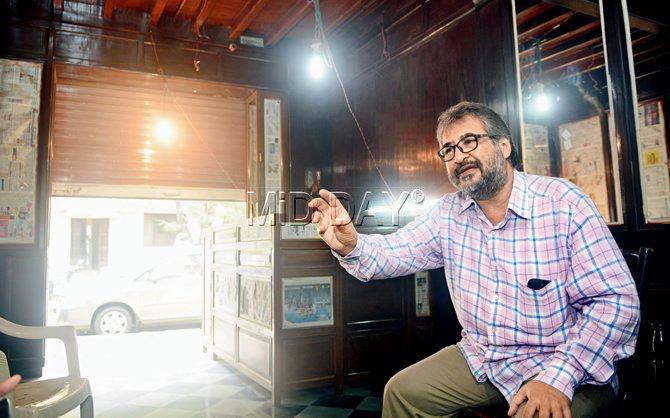
Dr Mansoor Showghi Yezdi has also used mirror panels across Café Irani Chaii. He says that the man behind the gulla (money counter) would use these to keep a watch on his customers. Pic/Sameer Abedi
Though a filmmaker by profession, Yezdi says he is a ‘chaiwalla’ at heart. “We have been in the café business since 1890. My father owned Light of Mahim on Cadell Road. He sold it to his partner in the 1980s,” he says. The café has now been replaced by a medical store. In 2013, the Mahim resident made a documentary on the Irani café culture of Mumbai, Pune and Hyderabad. Rashid Irani, film critic and owner of Brabourne at Dhobi Talao which shut in 2008, says drought in the regions of Yazd and Kerman in Iran caused the large scale Iranian migration in the early 20th century. Bombay, with its welcoming cosmopolitan culture, was an obvious choice for refuge. “Real estate was cheap back then, making it possible for them to rent spaces. About 90 per cent of the Irani café owners were tenants,” he adds.
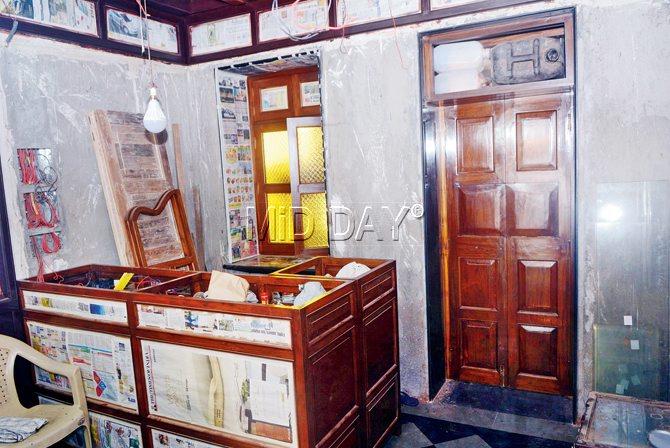
The traditional teakwood gulla at the new Mahim cafe. Pic/Sameer Abedi
Yezdi, whose grandfather was among those who migrated at the time, adds, “Young Iranian men would gather over cups of warm tea in the evenings, reminiscing about their homeland. And, at some point of time, someone decided to charge a small sum for the beverage and soon the Iranians were selling chai,” he laughs.
Turning somber, he says, it would sadden him to read about Irani cafés shutting down. In the last decade, nearly 10 have shut shop including Bastani and Brabourne near Dhobi Talao.
“We were gradually losing an integral part of city’s heritage. I felt it was my responsibility as an Iranian living in Mumbai to revive the dying breed of cafés,” he adds.

While owners of most Irani cafés struggle to keep the family interested in the business, new blood has trickled into Café Colony, near Hindu Colony in Dadar East. Last year, Bibi Fotimeh, Bibi Sadhaut and son Mirza Mohammed — children of owner Agha Irani Nazariyan — started pitching in. Pic/Sameer Abedi
Culture on a plate
Simin Patel, a DPhil in Oriental Studies from Balliol College, Oxford University, and the founder of Bombaywalla.org — a blog that chronicles the city’s heritage structures — recalls her favourite cafés. “At Paris Bakery in Dhobi Talao, when a customer enquires about the price of a packet of batasa biscuits, owner Danesh Nejadkay instantly offers a sample, instead. ‘Once you taste, you are trapped’, he will tell you,” says Patel, adding, that Nejadkay even offers batasa etiquette. “He will tell you to bite into the batasa, not break it. Offer or accept it with your right hand, soak it in a cup of tea for a minute or two, let it ‘blow up’ and then have it with a spoon,” adds Patel who is working on a book on Irani cafes with photographer Hashim Badami.
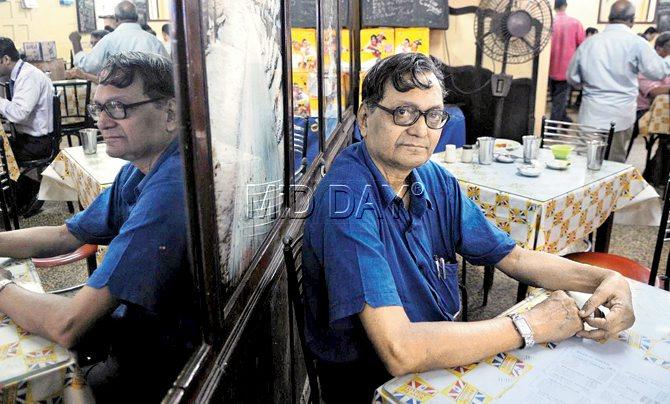
Rafique Baghdadi. Pic/Bipin Kokate
It’s this connect and comfort with the customer that Mohammed Hussain, Yezdi’s 31-year-old son, hopes to establish to beat his competition. To attract the crowds, Yezdi will don the traditional Iranian outfit garment — a long shirt, loose pants, a turban and geeveh (Iranain shoes) — every Sunday and personally serve the customers. “The idea is to revive the culture and keep the business afloat,” says Hussain, who will hold the fort once the café opens its doors for customers.
Veteran journalist Rafique Baghdadi sounds incredulous to hear about the new Irani café in town. Baghdadi, who over the years has made many curious Mumbaikars familiar with the Irani culture in the city with his heritage walks, reminisces the culture that they represent. “It’s absolutely cosmopolitan. It didn’t matter if you’re a celebrity or a common man; everybody was received with the same warmth,” says the 68-year-old, adding that of the 400 Irani cafés in the city in 1950s, only 30 remain. Baghdadi, who favoured Light of Asia at Fort during his college days, says part of the charm of a typical Irani cafe was its decor.
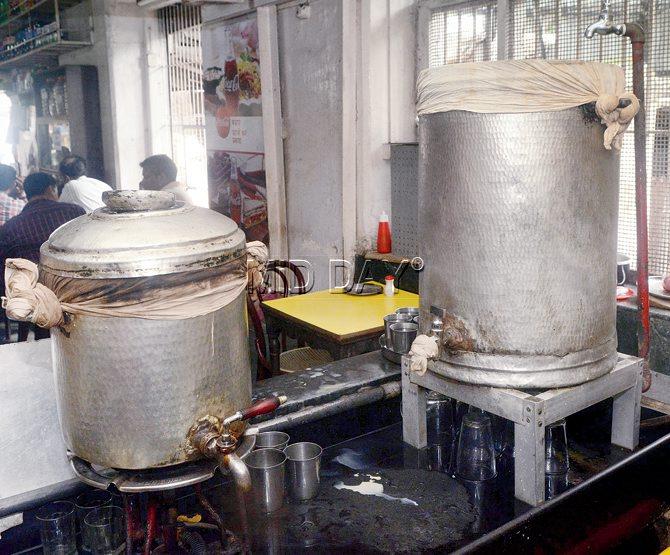
Little has changed about the place since the 1960s (when Nazariyan took over). Even today, the chai is made in the traditional samovar
“They have high ceilings, Persian inscriptions on their walls, old paintings of Iran, glass top tables and bentwood chairs,” he adds. When he hears that Yezdi has managed to find those, he exclaims, “You don’t find those Iranian artefacts anymore. I have three bentwood chairs, which cost me a fortune. One of them is broken and I can’t even find someone to fix it.”
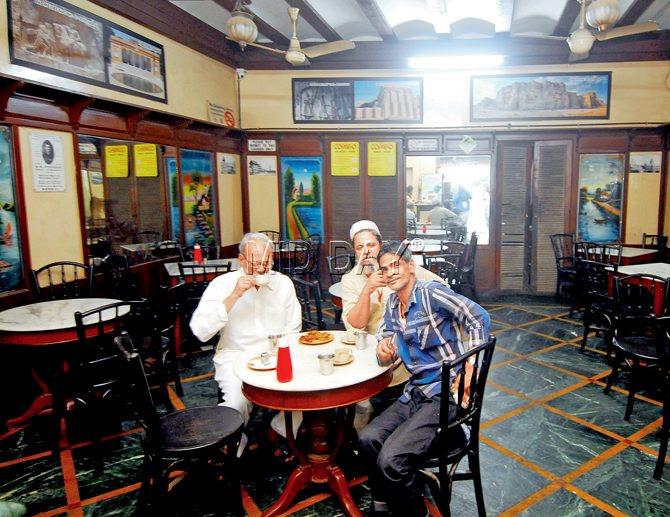
Rafique Baghdadi says part of an Irani café’s charm is to do with décor characterised by high ceilings, marble-top tables and bentwood chairs like you see at the 102-year-old Sassanian Bakery And Boulangerie at Dhobi Talao. Pic/Sameer Markande
Baghdadi also mentions that the city’s Irani cafés were the first to get a jukebox — this is where people would come to listen to music. Newspapers were also a big draw, he adds. “People would sit here and read the day’s papers. Often, one page would be at one table, and other, with a second guest,” says the Mazgaon resident. While Yezdi plans to keep an operational jukebox, he will also retain the gulla (the teakwood money counter). It’s also, why his walls will be mirror-lined. “The mirrors help the man at the counter keep an eye on each customer,” he laughs. But, it’s not just the décor that still serves as a draw. Food plays a big role as well.
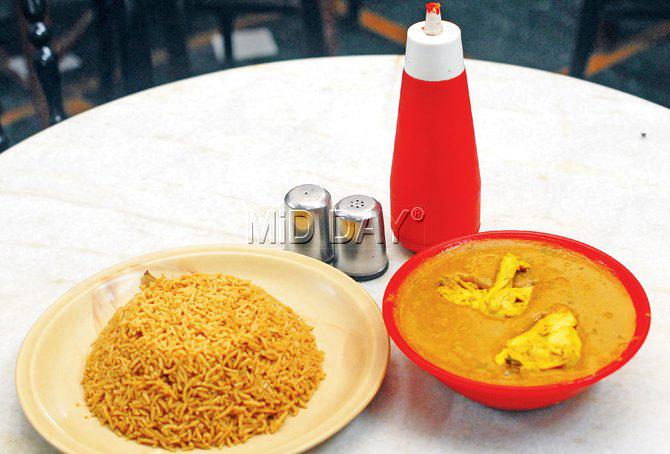
Dhansak at Sassanian are hallmark dishes. Yezdi hopes to recreate these on his menu
Most Irani cafés also function as bakeries, offering a range of items — cakes, khari, puffs — on its menu. It’s something that Yezdi hopes to replicate.
While the menu — which will be in Persian script along with a Hindi translation — will have Parsi staples like akuri, dhansak, sali boti, kheema pao and also Persian items like berry pulao (with berries imported from Iran), there will also be ‘seeni kabab’, a delicious Middle Eastern item. Desserts will include bakalava, halwa, cakes, pastries along with vanilla and strawberry ice-cream from Palonji. Duke’s rasberry soda, masala soda and gingerale will replace aerated drinks, says Yezdi adding that he will, in good humour, replicate the ‘do not’ board. Watch out for the ‘do not comb your hair’, ‘do not gamble’, ‘do not talk to the waiter’, ‘do not sit unnecessarily’ signs.
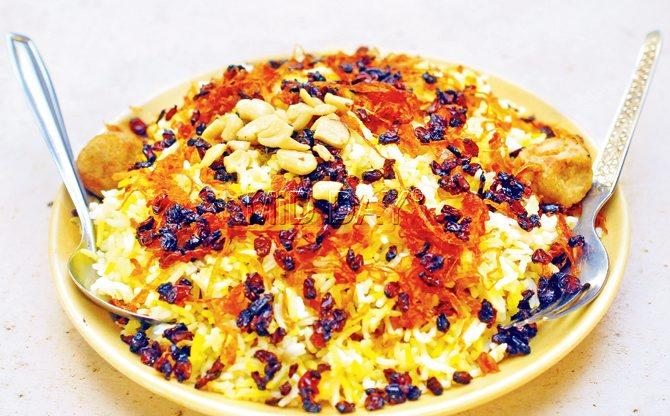
The Berry Pulav at Brittania & Co
Not about the money
For most of his life Yezdi has been a filmmaker. In 2007 year, he produced Ziarat, a documentary on the sufi saints of India, and has also directed Khanebedoosh, a documentary on Iranian gypsies who came to India around 500 years ago which he hopes to release soon. His son, Hussain, a commerce graduate has assisted him over the last 10 years — even though ‘he always wanted to start his own restaurant’.
Entering the restaurant business in Mumbai is a tricky decision, but Yezdi, who dredged up his personal resources to buy the Mahim space, says he is not in it for the money.
“The prices of food items will be on the lines of other cafés. In fact, anybody in uniform, school children or cops, will get a ten per cent discount,” he says. Just a few minutes before we arrived at the café, Yezdi tells us, an old man, walking past in, peered in and asked if it’s a Irani café. It’s this curiosity, he hopes, brings in others as well.
 Subscribe today by clicking the link and stay updated with the latest news!" Click here!
Subscribe today by clicking the link and stay updated with the latest news!" Click here!






